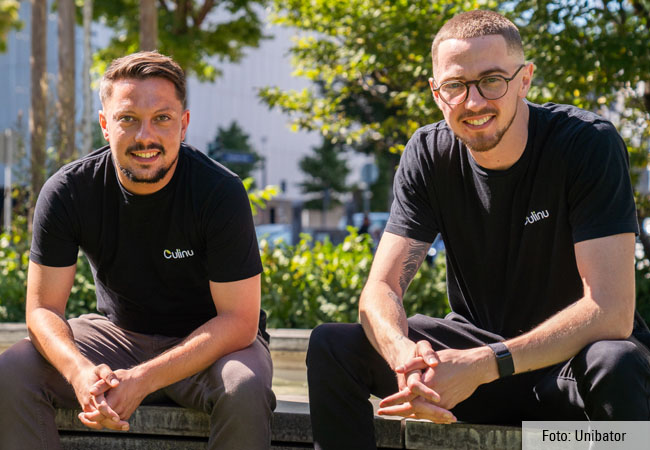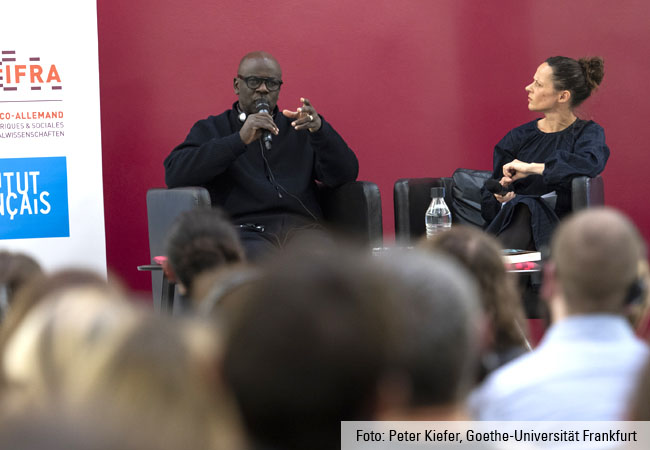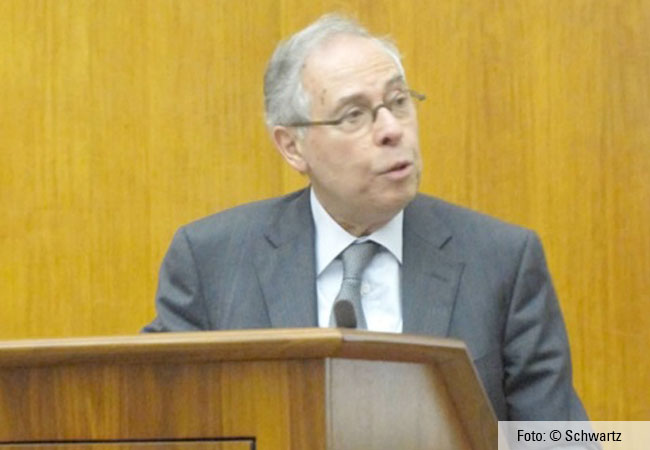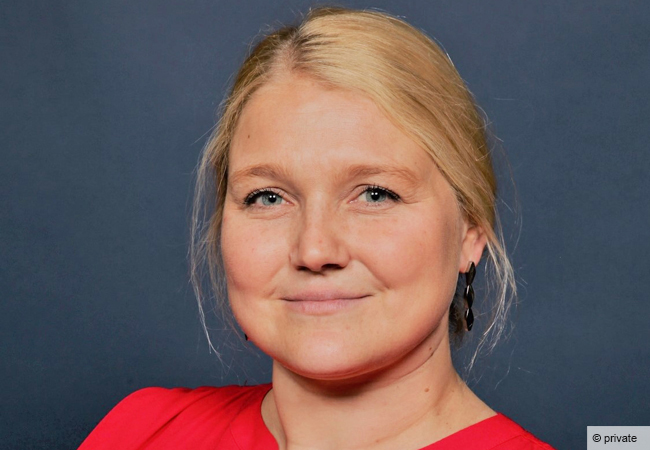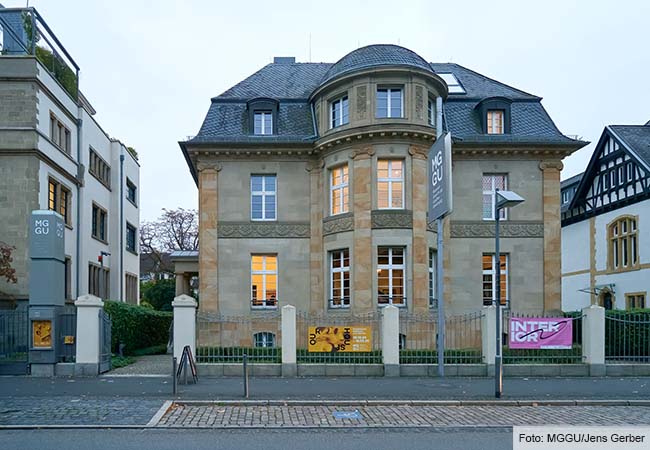Petra Schulz, professor of linguistics, looks at Germany’s latest “teen slang word of the year” announced at the 2024 Frankfurt Book Fair through a linguistic lens.

UniReport: Prof. Schulz, have you heard anyone using the word “aura” recently?
Petra Schulz: That’s a good question. I actually recently read in a newspaper article: “Someone’s aura was just depleted.” I think it was an ironic remark. In my family I’ve heard that “aura” is a word used by teenagers between the ages of 13 to 15. But even those older than 15 will probably have a different understanding of the word than you and I. What’s special about it is that if someone has a mishap, we can apply the term negatively. For instance, if somebody stumbles and falls over, the remark might be: “That gets you minus 500 aura points.” The word originates from the Greek and translates into “breath of air.” When the accolade was announced at the 2024 Frankfurt Book Fair, people were amazed that the winner wasn’t an English word. However, if one trusts some internet sources, the current spread of “aura” goes back to an American sports journalist describing an English soccer player: “His mistakes can be dismissed because, basically, he has an aura.”
But “aura” was already being used beyond youth slang.
Yes, but the same is true of quite a lot of these teenage slang words. It’s important to know that the youth word of the year is determined by the Langenscheidt Pons publishing house. The rules for the selection process were changed a few years ago. The word used to be chosen by a jury, but there were complaints that “Gammelfleischparty” [editor’s note: literally translates as “rotten meat party”, in reference to several domestic scandals involving spoilt meat], “Merkeln” [literally translates into “to merkel”, a teenage slang term used in the 2010s to describe indecisiveness], and “Babo” [slang term for “boss”] were not really representative. Nowadays, the suggestions come from an online survey. According to the publisher, hundreds of thousands of young people participated in the vote; but since their age is not checked, there is no way of being certain that only those aged between 10 and 20 took part. The word that came in third place in 2024 – “Schere” – was especially interesting. It’s an example suggesting that many youngsters who voted on the online platform are also active gamers, because gaming is where this latest use of “Schere” originated. Instead of saying, “Oh, I made a mistake,” someone on a gaming show held up a stylized picture of crab’s claws. One of the meanings of the German word “Schere” is crab’s claws – and it quickly turned into a term used to admit a mistake. Given that this involves quite a complicated etymology, I expect this term will probably quickly disappear again.
“Goofy” was the slang word of the year 2023. It, too, refers to something that is not exactly new: a long-standing comic character.
Yes, it’s a word from the 1930s. Its special feature from a linguistic perspective is that its English ending in “-y” makes it a great adjective. In German, too, we can inflect it and add the right ending. For example, I found a film review that said: “Er bringt seine goofige Art durch seine Gestik gut rüber.” (“His gestures really express his goofy nature.”). That’s actually a nice creative process. By the way, in English, use of the term “goofy” is not specific to youth slang.
The word “cringe” has taken on a special use since it was chosen as youth word of the year. Why?
I would say “cringe” obviously does a great job of filling a lexical gap. “To cringe” is an English verb meaning to shrink or flinch. I find that really impressive because the word actually expresses a physical reaction to somebody else’s bad or embarrassing behavior. That’s a level of meaning that goes beyond the German word “Fremdschämen” [literally translates as feeling shame on someone else’s behalf or feeling shame for someone who has done something embarrassing]. What’s more, “cringe” is much shorter. I think the term will stay with us.
Isn’t it also thanks to media attention that older people also resort to using the term, thereby helping ensure that it remains part of the general vocabulary?
My hypothesis is rather that a word manages to become a permanent part of the vocabulary if it fills a lexical gap and if its use is more economical than an alternative term, and, of course, if there are enough opportunities to apply it in on wider scale, i.e. beyond the small cohort of 13 to 15-year-olds. One thing publishers Langenscheidt Pons probably don’t want to hear is that as soon as a teenage slang word is chosen, it’s necessarily already “out”. After all, one of the basic functions of youth slang is that it serves as a demarcation to other terms – first and foremost from parents, and people who are older, but also from others of the same age. Usage becomes part of social identity, and serves as a signifier of belonging to the same group. Just like one chooses to wear either one type of jacket or another, we each choose to talk in one way or another. One of the questions I was asked at the Book Fair was why there are no senior citizens’ words, and whether we might award the senior citizens’ word of the year. My reply was that this is very unlikely. Senior citizens no longer need to find their identity and demarcate their social group; they have an identity. That being said, there are naturally words that older people use, like “Wählscheibe” [“telephone dial”], which a 13-year-old would probably not be familiar with.
Or for that matter others like “Telefonzelle” [telephone booth] or “Reklame” [“advertisement”] …
That’s right. The discussion about the youth slang word frequently also reflects a hint of general moaning about youngsters’ “poor” use of the language. But language evolves, whether we like it or not. We no longer talk the way people did in Goethe’s time. All the same, our grammar is relatively stable – that is well researched. Words, on the other hand, are a bit more flexible, depending on the concepts being represented. All told, the widespread assumption that more and more Anglicisms are entering the German language is not correct. According to Deutsches Fremdwörterbuch published by the Leibniz Institute for the German Language (IDS), which also includes neologisms that appeared between 1990 and 2019, only one third of new words came from English; two thirds consisted of German creations, including neologisms like “Dieselaffäre” [“Diesel Affair”, referring to the German automotive industry’s diesel emission scandal] “Merkeln” and “Scholz-O-Mat” [a term coined in the 2000s to describe Olaf Scholz’s ascribed ability to say very little in many words]. The public perception of neologisms is somewhat distorted. Another example of how language mutates are expressions that have become so well adapted to the German linguistic framework that purists complain are related to incorrect grammatical use. For example, do you say, “Das macht Sinn” [“That makes sense”]?
I think so. It would be correct to say, “Das ergibt Sinn” [“that yields / results in sense”] as satirist Max Goldt has long pointed out.
Yes, it comes from the English phrase “It makes sense.” A more recent example would be “ich bin fein damit.” In German, the adjective “fein” doesn’t have much in common with the American “fine” used in the phrase in “I’m fine with that.” But now “fein” seems to have acquired another level of meaning in this context – and ceased to be an adjective. Our linguistic system is incredibly good at adopting words – and sometimes structures as well – from other languages. In fact, this works so well that it simply goes unnoticed after a few decades or centuries. Just think of “Streik” for instance, which comes from the English word “strike.” Today’s German vocabulary, just like the vocabularies of all other languages, is very diverse and has been influenced by a wide variety of other languages. Apart from Germanic words, German also exhibits influences from Latin, Greek and Arabic.
This was the second time you were the expert invited to announce the youth word of the year at Frankfurt Book Fair. What do linguists find so interesting about this slang term?
My impression is that youth words, including and much like gendered language, represent aspects of language about which everyone has an opinion and which engage everyone. As a linguist, that is something I am naturally pleased about. My main field of research is actually language acquisition by younger children. That being said, I do think the topic of the youth word should also be underpinned with linguistic expertise. It’s also a nice example we can use to explain how language works, what words express, and much more.
Is it possible to define in linguistic terms exactly what constitutes youth slang?
The key features of youth slang are the vocabulary and certain features of grammar usage and discourse culture, which are actually not that easy to describe. That’s why the competition for youth slang word of the year is conducted at the right level. We can use our vocabulary to express what we have in common, and also what differentiates us. Using language also always means being creative. That’s exactly what young people do when they use the term “aura” with a prefix (“minus-aura”). As part of my research, I examine the language of children aged two to twelve. When children are mastering a language’s vocabulary, they also start inventing words. A two-year-old might say “stoffen”, for instance, and the context offers further information on what she meant: In this instance, the child wants to glue some fabric (“Stoff”) to a surface. That’s a wonderful example of adding the ending “-en” to a noun to create a verb. Alas, this particular word will never become the youth word of the year because there’s no great lexical gap for it to fill. In any case, a two-year-old would not have the capability of spreading such a word to the wider population; that naturally depends on the peer group. That’s why teenagers are so good at disseminating words.
Youth words since 2010
2024 Aura – personal aura/charisma or status, often used humorously
2023 goofy – clumsy, stupid person or behavior
2022 smash – start something with someone
2021 cringe – something embarrassing
2020 lost – clueless, confused
2019 [No youth word]
2018 Ehrenmann/Ehrenfrau – good person
2017 I bims – It’s me
2016 fly sein – to be awesome
2015 Smombie – combination of smartphone and zombie: people who, while walking, constantly stare at their cell phone and therefore don’t notice things
2014 Läuft bei dir – Great work! You did it! Cool!
2013 Babo – boss
2012 YOLO – You only live once
2011 Swag – being cool, casual
2010 Niveaulimbo – meaningless conversations, that descend into ever lower levels of discourse
Source →





